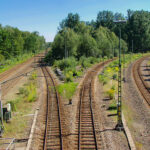Summary –German’s Bundestag elections show how neoliberal centrism paves the way for the rise of right-wing politics while failures on the left to develop alternatives to capitalist society have stifled their movement. What is to be made of the emergence of a new potential alliance of the black, green, and yellow? – Editors
To best understand the results of the Bundestag elections, it is important to remember Germany’s political and economic place in Europe and in the world. In 2016, Germany exported 1.2 trillion euros worth of goods and services and imported 950 billion euros. Theirs is by far the strongest economy in Europe, hence its dominant role in European relations, and its efforts to achieve greater dominance in the world at large.
Germany has about 82.8 million inhabitants, of whom 61.5 million were entitled to vote in the elections; 76.1% participated.
The power relations in the new Bundestag between the parties now look as follows:
CDU/CSU: 32.9% 246 mandates
SPD : 20.5% 153 mandates
AfD : 12.6% 94 mandates
FDP : 10.7% 80 mandates
Die Linke : 9.2 % 69 mandates
Grünen : 8,9 % 67 mandates
The most remarkable feature of this election is the swing to the right which is reflected in the turnout for the Alternative für Deutschland (AfD), a right wing, racist and populist party which is swarming with neo-Nazis. Leading representatives of the AfD can be heard relativizing the meaning of Auschwitz and trumpeting the role of German soldiers in World I and II. Their party gained 12.6% of the votes.
Since World War II a neo-Nazi undercurrent has been present in Germany, but it had no representation in the Bundestag. These latest election results mean that for the first time since World War II there will be a party to the right of the conservative CDU/CSU. Neo-Nazis will be present in the Bundestag.
The result of the AfD is less surprising when we look to the current political climate in Germany. The Nationalsozialistische Untergrund (NSU) had a free hand in murdering eight people of Turkish descent and two other persons between 2000 and 2007. State security forces, with special agents often recruited from neo-Nazi circles, has infiltrated leftist circles. Anti-fascism has frequently been criminalized. The state and its supporting parties, and above all the CDU/CSU, has ignored threats emerging from the right and has instead focused its aggression on the radical left. These same forces are now weeping crocodile tears about the rise of the AfD.
Significantly, the AfD won strongly in the east of Germany (the former DDR) and in Bavaria and Baden Württemberg in the south, thus demonstrating that the AfD did not simply win in the poor regions of Germany. Right-wing populism is not a phenomenon of only poor or jobless people, in Germany or elsewhere. In a previous article, I pointed out that since 2008, right wing populism “received a major push from the greatest global economic crisis in capitalist society since 1929” and that “it emerged under the consequences of imperialist politics: growing inequality, wars, streams of refugees, racism, Islamic fundamentalism, etc.”
(https://www.internationalmarxisthumanist.org/articles/ocean-crisis-right-wing-populism-awakening-fascism-vs-marxist-humanism-freedom-karel-ludenhoff)
Another feature of these elections is the decline of the CDU/CSU. While it remains the greatest party combination, it has lost in absolute numbers about one million voters to the AfD. The CSU, a right conservative party in Bavaria affiliated to the CDU, lost 10% to the AfD in this election.
The losses for the social democratic party, the SPD, were dramatic too. This party lost about 5%, their worst turnout in Bundestag elections since World War II. The SPD was responsible for the concept and implementation of Agenda 2010, which marked a frontal attack on the interests of working class people. Agenda 2010 was worked out by leaders of the SPD to strengthen neoliberal policies in cooperation with leading industrial ideologues at the time of the chancellery of Gerhard Schröder. One such ideologue was Peter Hartz, a leading industrialist at Volkswagon, who ushered in the Hartz Reforms, which infamously impacted poor and jobless Germans. Merkel, the CDU/CSU, and above all big, internationally-oriented German firms were grateful for this Agenda, which paved the way for the coalition of CDU/CSU and SPD in 2013. The 2017 elections have destroyed this coalition, the enfeebled SPD having ruled out any such collaboration with the CDU. Besides heightening socioeconomic inequality in Germany through Agenda 2010, the SPD is also responsible, in cooperation with the CDU/CSU, for imperialistic military interventions abroad.
In working to advance neoliberal agendas domestically and internationally, the SPD and the CDU/CSU has created a breeding ground for right-wing populism in Germany. The proof lies in the 2017 election results.
At the same time, the 2017 elections witnessed a small rise of a party left of the SPD: Die Linke. Die Linke has portrayed itself as member of a red-red-green political alternative. In this conception, Die Linke saw the SPD as the other “red”, which is somewhat baffling. After all, Die Linke itself firstly stood for withdrawal of German troops from conflicts and worked against sending arms exports to conflict areas. Further, Die Linke has supported higher minimum wages, earlier and better pensions, and more progressive taxation.
For all this, Die Linke has failed to work out an alternative to capitalist society. Die Linke restricted itself to arguing for redistribution of wealth, thus not engaging in class struggle that might usher in a new mode of production. Even Sarah Wagenknecht, a leader in the party’s election campaign known for her Marxist rhetoric, went so far as to extol the “social market economy” policy of Ludwig Erhard, the architect of the Wirtschaftwunder (economic miracle) in 1950s and ‘60s Germany – a policy of full blown capitalism.
Die Linke also failed to advocate for refugees seeking relief in Germany. Regarding inhumane treatment of refugees, Wagenknecht half-heartedly said, “there were perhaps also certain problems being ignored there, in the anxiety that one might stir up resentment.” For these weak comments, which left far too much room for the AfD to politically capitalize on the refugee crisis, she has been criticized by the more left factions in the party and the radical left outside the party.
As to the Green Party as an ally in Die Linke’s alternative conception of a red-red-green alliance, this party mostly limits its analysis to environmental issues without making the necessary connections between environmental degradation and capitalist production relations. Amidst all this, the FDP liberal party, which has its base mainly in circles of capitalists and small bourgeois stratums, is entering the Bundestag after four years of absence.
Because the SPD directly declared that it would not participate in a new coalition of CDU/CSU-SPD, there is at the moment only one option for a new government: a combination of CDU/CSU, Green Party, and FDP. Because the colours of these parties are black, green, and yellow, this combination is named the “Jamaica combination”, though for now this coalition is purely speculative.
We can interpret these German election results as a microcosm of a crisis ridden world. We see a powerful economic development of Germany, but shrouded in capitalism that promises growing inequality. On one side we see increasing enrichment for the owners of capital, and on the other side there is rising exploitation of working people, cuts in public welfare, the browbeating of poor and jobless people through Hartz IV law, corruption in industry (for example, in the German auto concerns), discrimination against Muslim people, rising anti-Semitism, etc. This unequal development reverberates internationally. German capital’s imperial march will continue to create problems for those living inside and outside its borders.
We as Marxist-Humanists know that there are no blueprints for the future. However, based on historical experience and the development of the totality of Marx’s philosophy, we know there is the potential to change capitalist society in a human-oriented world. As Marxist-Humanists we can and must act as a catalyst in creating a human alternative to the barbarism of capitalist society. Our notion of this alternative can be a contribution to the German Left, precisely because it also rings through in the words of the motto by Johannes Agnoli:
“The utopia of the ‘society of the free and equal’ (Marx) cannot be introduced into the Bundestag as a legislative proposal of neither oppositional nor governing factions.”






0 Comments